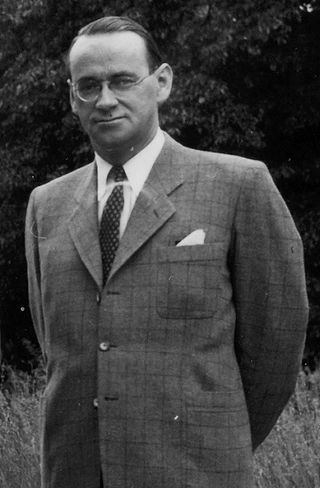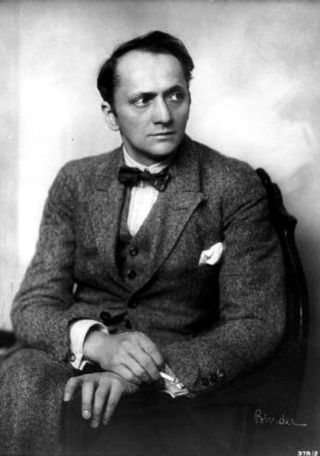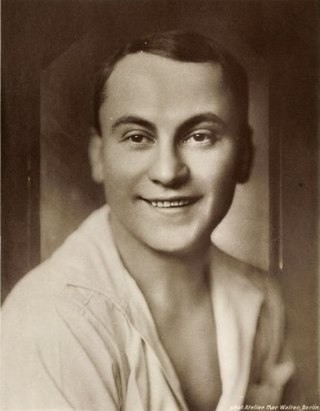
The German Templer Society, also known as Templers, is a Radical Pietist group that emerged in Germany during the mid-nineteenth century, the two founders, Christoph Hoffmann and Georg David Hardegg, arriving in Haifa, Palestine, in October 1868 with their families and a few fellow Templers in order to establish a colony. Templer theology is rooted in the legacy of preceding centuries during which various Christian groups undertook to establish the perfect Christian religion in preparation for Christ's promised return. The movement was founded by Christoph Hoffmann, [1815-1885] who believed that humanity's salvation lay in the gathering of God's people in a Christian community. He also believed that the second coming of Christ was imminent, and that according to Biblical prophecy it would take place in Jerusalem, where God's people were to gather as a symbol of the rebuilding of the temple.
Plato Freiherr von Ustinov was a Russian-born German citizen and the owner of the Hôtel du Parc in Jaffa, Ottoman Empire.

Carl Lutz was a Swiss diplomat. He served as the Swiss Vice-Consul in Budapest, Hungary, from 1942 until the end of World War II. He is credited with saving over 62,000 Jews during the Second World War in a very large rescue operation.

Werner Johannes Krauss was a German stage and film actor. Krauss dominated the German stage of the early 20th century. However, his participation in the antisemitic propaganda film Jud Süß and his collaboration with the Nazis made him a controversial figure.

Georg Friedrich Wilhelm Rosen was a German (Lippe/Prussian) orientalist and diplomat.

Theodor August Konrad Loos was a German actor.

The German Colony was established in Ottoman Haifa in 1868 as a Christian German Templer Colony in Palestine. It was the first of several colonies established by the group in the Holy Land. Others were founded in Sarona near Jaffa, Galilee and Jerusalem.
The postage stamps and postal history of Palestine emerges from its geographic location as a crossroads amidst the empires of the ancient Near East, the Levant and the Middle East. Postal services in the region were first established in the Bronze Age, during the rule of Sargon of Akkad, and successive empires have established and operated a number of different postal systems over the millennia.

Kurt Vespermann was a German stage and film actor.

Immanuel Church is a Protestant church in the American–German Colony neighbourhood of Tel Aviv in Israel.

The American–German Colony is a residential neighborhood in the southern part of Tel Aviv-Yafo, Israel. It is located between Eilat Street and HaRabbi MiBacherach Street and adjoins Neve Tzedek. It was originally established as an American colony, but when that failed, it was resettled and became a German Templer colony, which in time evolved into a mixed German Protestant colony.

Gustav Bauernfeind was a German painter, illustrator, and architect. He is considered to be one of the most notable Orientalist painters of Germany.
Thorleif Paus, also known as Thorleif de Paus or Thorleif von Paus, was a Norwegian diplomat, estate owner and businessman. As a 23 year old consular secretary he became Norway's only diplomatic representative to the great power of Austria-Hungary in 1905 and in charge of obtaining diplomatic recognition of Norway following the dissolution of the union between Norway and Sweden; he later served as consul and acting consul-general in Vienna. Paus left Austria-Hungary in 1918 and later became a businessman in Norway, an estate owner in Sweden, where he owned Kvesarum Castle, and finally moved to Copenhagen.

The Hotel Jerusalem was the first ever luxury hotel outside of old Jaffa. It operated between the years 1870 and 1940 and had 57 rooms that occupied 1899 square meters. It was located on Rehov Auerbach #6 in the historic American Colony that soon became known also as the German Colony. The hotel is an important landmark in the development of Jaffa in the second half of the 19th century by being the first hotel outside of Jaffa’s city walls. Currently the building is part of the top-end Drisco Hotel.
The German Templer colonies in Palestine were the settlements established in Ottoman Palestine and Mandatory Palestine by the German Pietist Templer movement in the late 19th and early 20th century. During and shortly after World War II, these colonies were depopulated, and its German residents deported to Australia.
Guido Leopold Schoenberger was a German-American art historian.
Rudolf Ernst Alfred Arthur von Bülow was a German diplomat.












